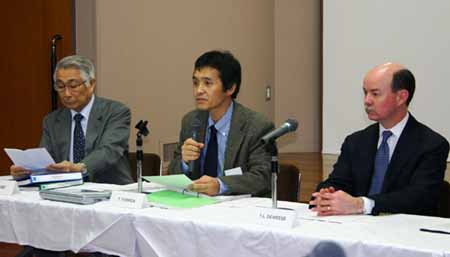Scientific Council provides recommendations for RERF research
Mar. 12, 2008
by Hiromi Morita, Staff Writer
On March 5, 2008, the Scientific Council of the Radiation Effects Research Foundation (RERF) issued recommendations urging RERF to strengthen its research components such as expanding the number of subjects for its Adult Health Study, conducted every other year, and continuing its research into the health of second-generation survivors. Composed of outside experts, the Council spent three days examining the content of the Foundation's research.
Dr. Teruhiko Yoshida, Co-Chair of the Scientific Council and Chief of the Genetics Division at the National Cancer Center Research Institute, led a press conference to report these recommendations. He pointed out that the number of deaths from radiation-induced cancer will peak in ten years and stated, “In order to obtain relevant scientific findings, the Adult Health Study must be enhanced in such ways as conducting a survey by mail and adding younger A-bomb survivors as subjects of research.”
In regard to the study investigating the possibility of health effects on second-generation survivors--about which RERF reported last year that so far no differences have been detected between the children of A-bomb survivors and the children of others--the Council stressed, “This study should be maintained as an ongoing area of research.”
In response, RERF intends to add 2,300 more people to the Adult Health Study, including survivors who were exposed to the bombing when they were age 9 or younger. And the Foundation is now discussing the continuation of their research involving the potential health impact on second-generation survivors. Takanobu Teramoto, Permanent Director of RERF, said, “We will draw firm conclusions after we receive the final report from the Joint Senior Review Group (an external body consisting of experts from both Japan and the U.S.).”
On March 5, 2008, the Scientific Council of the Radiation Effects Research Foundation (RERF) issued recommendations urging RERF to strengthen its research components such as expanding the number of subjects for its Adult Health Study, conducted every other year, and continuing its research into the health of second-generation survivors. Composed of outside experts, the Council spent three days examining the content of the Foundation's research.
Dr. Teruhiko Yoshida, Co-Chair of the Scientific Council and Chief of the Genetics Division at the National Cancer Center Research Institute, led a press conference to report these recommendations. He pointed out that the number of deaths from radiation-induced cancer will peak in ten years and stated, “In order to obtain relevant scientific findings, the Adult Health Study must be enhanced in such ways as conducting a survey by mail and adding younger A-bomb survivors as subjects of research.”
In regard to the study investigating the possibility of health effects on second-generation survivors--about which RERF reported last year that so far no differences have been detected between the children of A-bomb survivors and the children of others--the Council stressed, “This study should be maintained as an ongoing area of research.”
In response, RERF intends to add 2,300 more people to the Adult Health Study, including survivors who were exposed to the bombing when they were age 9 or younger. And the Foundation is now discussing the continuation of their research involving the potential health impact on second-generation survivors. Takanobu Teramoto, Permanent Director of RERF, said, “We will draw firm conclusions after we receive the final report from the Joint Senior Review Group (an external body consisting of experts from both Japan and the U.S.).”








